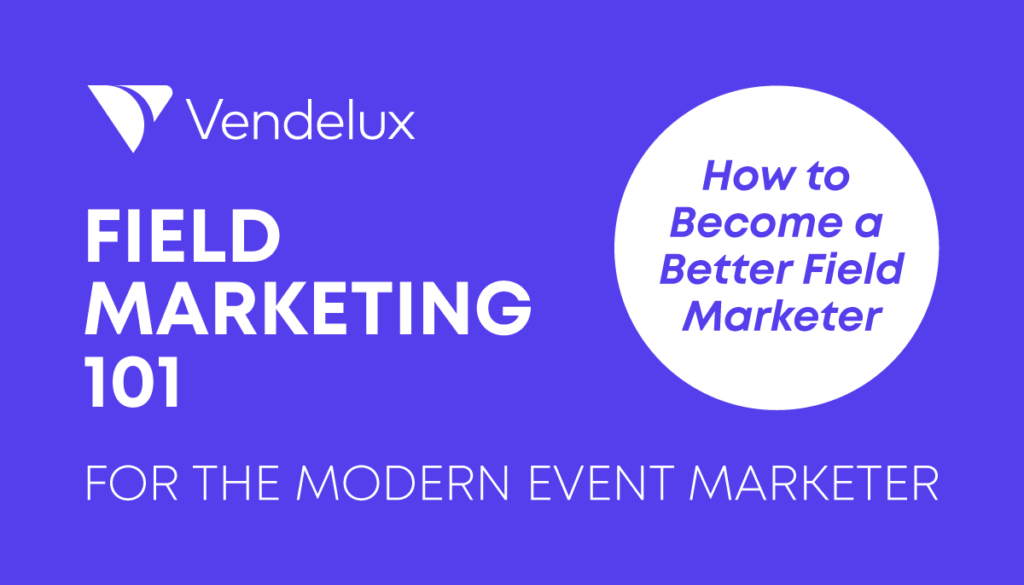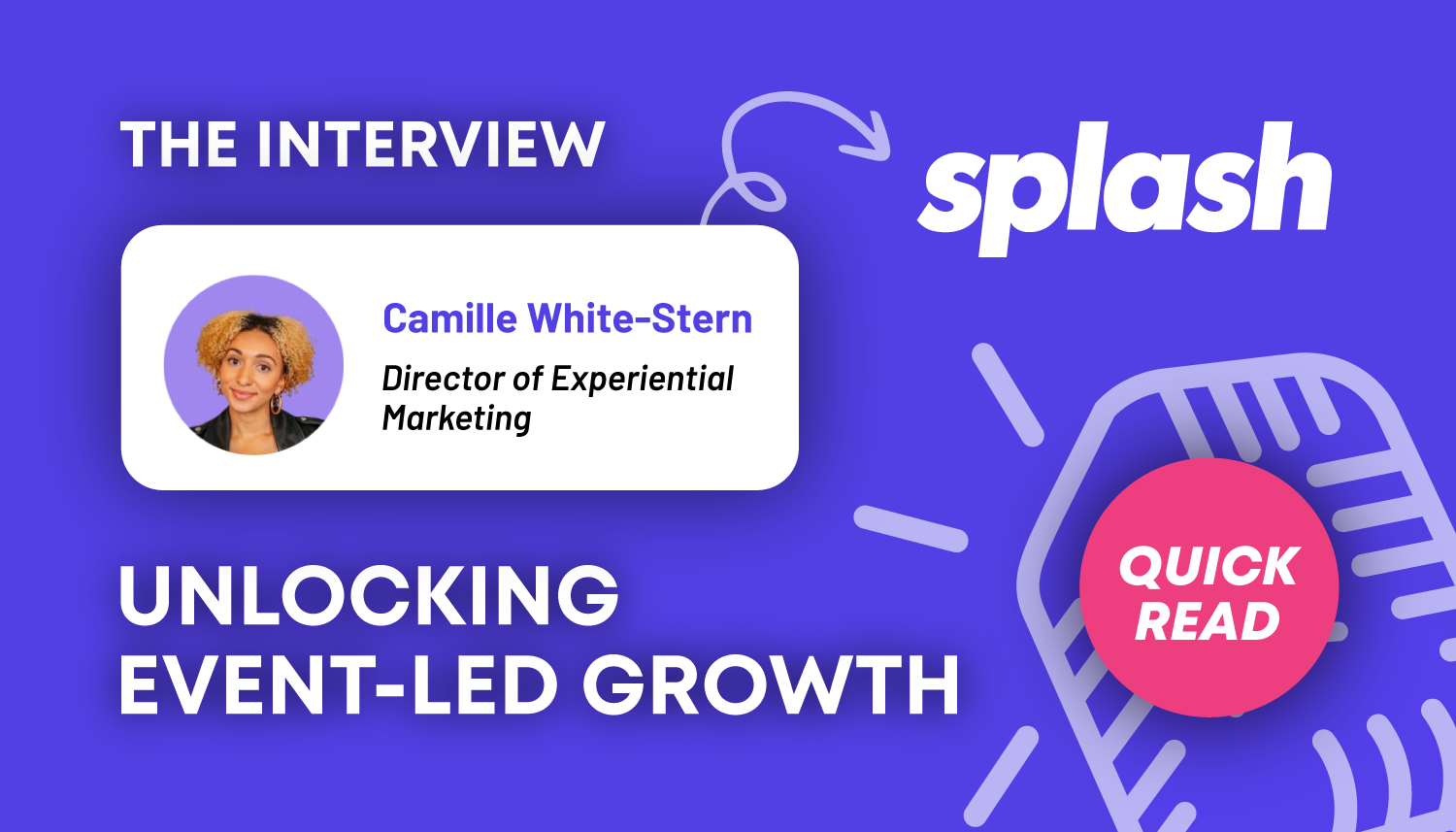If you are currently an event marketer, it’s highly likely you are already implementing field marketing strategies. But having a deeper understanding of field marketing will definitely take your events to an entirely new level.
From building brand awareness to customer interaction to boosting product sales, the fundamentals of field marketing will allow you to best represent a brand and cater to its target audience for optimal business growth.
What is Field Marketing?
Field marketing is a dynamic approach where brands actively bring their products directly to potential customers. This hands-on marketing strategy is utilized in both B2B and B2C contexts, often involving in-person events and interactions. Field marketing can encompass a range of activities, from product displays and brand representation in various retail locations and events to more direct tactics like brand demos, trade shows, and product samplings.
Key elements of field marketing include experiential marketing, guerrilla marketing campaigns, and targeted customer campaigns. The role of field marketing managers and their teams is crucial in executing these strategies effectively. They work closely with sales teams to ensure that marketing efforts align with business objectives and sales targets. This collaboration helps in building customer relationships and strengthening the sales pipeline.
A successful field marketing strategy focuses on reaching the target audience where they are. This can mean engaging with customers through street promotions, in-store promotions, or even virtual events. Field marketing efforts are designed to enhance brand awareness and position the brand favorably in the minds of potential customers.
Incorporating field marketing into the overall marketing strategy allows for a more personalized customer experience. It leverages direct sales and face-to-face interaction to attract customers and generate leads. Field marketing teams use various marketing materials and promotional materials to create engaging and memorable brand experiences.
What Does a Field Marketer Do?
Role and Responsibilities
Field marketers play a crucial role in bridging the gap between a brand and its target audience. These professionals are responsible for designing and executing field marketing campaigns that resonate with the intended demographic. Their activities range from organizing in-person events and virtual events to executing guerrilla marketing tactics. They are the front-line representatives of the brand, often serving as brand ambassadors in various settings.
Strategy Development
Developing a field marketing strategy is a key part of a field marketer’s job. This involves analyzing market trends, understanding the marketing funnel, and identifying the most effective marketing tactics to reach the target audience. Field marketers must balance digital marketing efforts with traditional marketing approaches to create a comprehensive plan that covers all bases.
Collaboration and Execution
Field marketers work closely with sales teams and marketing teams to ensure alignment of goals and strategies. They often lead street team representatives in street promotions and are involved in content management systems to keep track of marketing collateral. This collaboration extends to customer relationship management, where they collect qualitative data to refine marketing strategies further.
Measuring Success
A significant part of a field marketer’s role involves tracking the success of field marketing campaigns. This includes monitoring lead generation efforts, sales conversions, and the overall impact on brand perception and revenue targets. They use these insights to adjust tactics and strategies, ensuring continuous improvement in their marketing efforts.
What Are the Benefits of Field Marketing?
Enhanced Brand Perception and Engagement
Field marketing strategies, particularly those involving experiential marketing and in-person events, significantly enhance brand perception. By engaging directly with the targeted audience, field marketing activities foster a more personal and memorable connection with the brand. This direct engagement, whether through trade shows, guerrilla marketing, or street team representatives, leaves a lasting impression that often translates into brand loyalty.
Improved Lead Generation and Sales
A key benefit of field marketing is its effectiveness in lead generation. Field marketers, through various field marketing tactics, are able to interact directly with potential customers, understanding their needs and preferences. This direct interaction, supported by a cohesive marketing campaign, helps in converting leads into sales more efficiently. The collaboration between the field marketing team and the sales department ensures that the marketing efforts are aligned with the sales objectives, leading to better sales results.
Greater Audience Insight and Targeting
Field marketing campaigns offer valuable insights into customer behavior and preferences. Field marketing representatives gather real-time feedback and data during in-person marketing strategies and virtual events. This data is crucial for refining audience targeting and enhancing the overall marketing strategy.
Cost-Effective and Measurable Results
Compared to traditional marketing methods, field marketing can be more cost-effective. With a targeted approach, field marketing ensures that marketing budgets are spent more efficiently. Additionally, the use of content management systems and digital marketing tools allows for better tracking and measurement of campaign effectiveness, helping to allocate resources more effectively.
Strengthening Customer Relationships
Field marketing is instrumental in building and strengthening customer relationships. Through personalized interactions, field marketing teams can create a more intimate and trusting relationship with customers. This is particularly important for beverage brands and other sectors where customer loyalty is key.
Synergy Between Marketing and Sales
Field marketing fosters a strong collaboration between marketing and sales teams. This synergy ensures that marketing activities are carried out with a clear understanding of sales objectives, leading to a more unified approach in reaching business goals.
Flexibility and Innovation
Field marketing allows for a high degree of flexibility and innovation in marketing tactics. Field marketing managers can quickly adapt strategies to changing market conditions or consumer trends. This includes the use of guerrilla marketing, account-based marketing, and innovative digital marketing strategies in their field marketing campaign.
Comprehensive Marketing Approach
Field marketing complements other marketing activities by adding a personal touch that digital-only strategies might lack. Whether it’s through a well-coordinated field marketing council or individual field marketing representatives, these strategies ensure a comprehensive approach to reaching and engaging customers.
Field marketing success offers a multitude of benefits, from enhanced brand engagement and efficient lead generation to cost-effective marketing strategies and strengthened customer relationships. These benefits make field marketing an indispensable part of the overall marketing process and sales strategy for businesses looking to make a tangible impact in their market.
Role within the Business Structure
A field marketing organization is an integral part of a company’s broader marketing and sales framework. It operates in tandem with other departments to ensure a cohesive approach to brand representation and customer engagement. By integrating field marketing into the business model, companies can ensure that their marketing efforts are not only consistent but also deeply aligned with their overall business goals.
Field Marketing for B2B Companies
As event marketing is increasingly incorporated into B2B marketing strategies, many field marketers are focusing a significant portion of their efforts on event-specific marketing goals.
For a field marketer, this could look like supporting a sales team, facilitating a workshop or training, hosting a demo, or interacting directly with customers and clients in some other way. This is especially helpful for B2B lead generation.
Sometimes referred to as a field marketing manager or specialist, a field marketer will typically work with sales and an event marketing manager to make sure everything runs as seamlessly as possible and business objectives are met at events.
Recommended Events for Field Marketing
1. Roadshows
A great opportunity to lure in passersby and generate new leads, roadshows are an ideal way to get the brand out in the public eye. A booth set up or giving out branded collateral is a casual and easy way to engage and convert leads.
2. Conferences
Large events like conferences are a perfect place for field marketers to flex their networking skills. They can get to know their clients’ needs or thoughts on a deeper level, and interact with potential leads through formal demos or informative workshops.
3. Face-to-Face Meetings
In-person meetings are extremely beneficial in building an intimate bond between the field marketing team and target clients. A field marketer can more easily walk a potential client through using the product or service and work in tandem with sales to close a deal.
4. Webinars or Digital Events
Since the pandemic, more B2B companies are shifting to digital events to generate leads. Online webinars or forums are a great opportunity to familiarize clients or customers with the brand and the services offered, sometimes with a direct call to action to purchase or join.
Helpful field marketing tips for events:
1. Have an event marketing plan
In event-based marketing, an event marketing strategy that incorporates field marketing tools is critical to achieving business goals. Make sure to be clear and thorough, and that ideally, everyone is on the same page before the execution.
2. Use event marketing software
Software built specifically for event marketing helps you track all the moving parts and oversee the full campaign. An organized and automated workflow allows you to more effectively delegate roles and responsibilities to team members.
3. Articulate the brand values
Be clear on what the brand is about to the T. What do they believe in? What is their purpose and how does their product meet this end? Have an elevator pitch ready and make sure to have some clear guidelines for this for all parties involved so that the messaging is consistent.
4. Know your audience
Instead of focusing on the attendee numbers, zero in on the target audience. Who is the event for? Is it for CFOs of large corporations or IT department reps? The messaging should be catered to the specific audience so they feel understood, engaged, and inclined to invest in your product or service.
5. Use Event Intelligence Software
Event intelligence removes the guessing element in choosing the right event for your business, and helps you find events your target audience attend or speak at. Event intelligence is important for marketers as it saves time and increases efficiency, helps you to make sure you’re in the right place at the right time, helps you build better relationships with your target audience, and it gives you a competitive advantage. Companies that are successful at events have done their homework – knowing exactly who will be at an event before it happens, and building a relationship will help you to increase your event marketing ROI.
6. Be clear about the offer and overdeliver
If you tell the attendees they will be offered a discount for a free subscription to your service, they will expect it. Make sure that you are delivering your promise and always work to exceed expectations. Overdelivering a surprise offer or bonus is always a great way to keep people excited about the brand.
7. Become savvy at sales
In sales, timing and delivery are everything. You don’t want to oversell your customer or client right away. At an event, make sure there are ample opportunities for a client to tell their story, to create an opportunity for connection and empathy before trying to sell them on the product or brand service. If you work with a sales and marketing team, make sure you’re all on the same page so everyone is able to tag the team and work together.
Takeaways
Field marketing is used to build the awareness of your brand and also implement sales and marketing strategies into your event planning. It gives your ideal client or customer a way to engage with your brand and try out your product or service before purchasing. At the same time, it also gives the company an opportunity to get to know its target consumers better through qualitative data collection and increase conversions through strategic marketing campaigns.
There are plenty of ways to incorporate field marketing into your next event. So make sure to try them out and continuously stay ahead of the curve with new, innovative marketing strategies!




